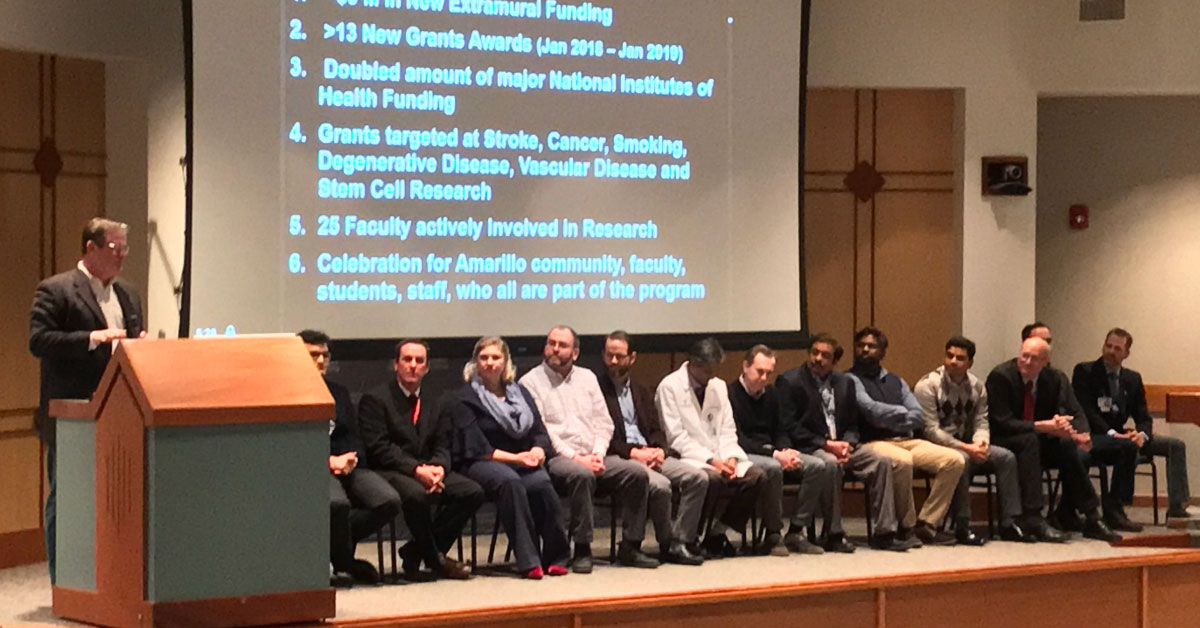School of Pharmacy Shines Spotlight on Research
Grants Awarded to School Top $9.2 Million
 The Texas Tech University Health Sciences Center (TTUHSC) School of Pharmacy on Jan. 29 announced its researchers received more than $9.2 million in new research
funding from January 2018 through January 2019.
The Texas Tech University Health Sciences Center (TTUHSC) School of Pharmacy on Jan. 29 announced its researchers received more than $9.2 million in new research
funding from January 2018 through January 2019.
More than $8.4 million of the school’s new research funding came from the National Institutes of Health (NIH), including the National Cancer Institute (NCI), the National Heart, Lung and Blood Institute (NHLBI) and the National Institute for Neurological Disorders and Stroke (NINDS). Researchers also received funding from the U.S. Department of Defense (DOD), the Society of Toxicology (SOT) and others.
Quentin Smith, Ph.D., TTUHSC senior vice president for research and School of Pharmacy dean, said the grants focus on research areas related to cancer, cardiovascular health, neuroscience, drug development and women’s health.
“The School of Pharmacy is known for its Pharm.D. program that emphasizes clinical training, but we are equally proud of our science faculty who conduct biomedical and pharmaceutical research focused upon disease mechanisms, drug formulation and delivery, drug synthesis, drug action and clinical practice,” Smith said.
Texas Tech University System Chancellor and TTUHSC President Tedd L. Mitchell, M.D., said the discovery of new knowledge through cutting edge research is a core mission for TTUHSC.
“The School of Pharmacy’s externally funded peer-reviewed research is truly excellent and it is growing rapidly, just as it is throughout TTUHSC,” Mitchell said. “This celebration recognizes the outstanding work of our School of Pharmacy investigators who are committed to making our state and country are healthier through research in various types of drug development. Dean Smith’s leadership will ensure that we continually foster innovation.”
School of Pharmacy researchers who received new grants include:
- Fakhrul Ahsan, Ph.D., $2,366,265 (NIH), “Recapitulation of Sex Disparity in PAH on a Microfluidic Device and Elucidation of the Differences and Similarities”
- Ahsan, $108,537 (Cardiovascular Medical Research and Education Fund), “PAH-Mimicking Chip to Elucidate Sex-Based Pathogenesis to Develop Gender-Specific Therapy”
- Ulrich Bickel, Dr.Med., $28,636 (Therachon), “Pharmacokinetics and Brain Uptake of Recombinant SFGFR3”
- Hiranmoy Das, Ph.D., $224,999 (NIH), “Development of Nanofiber Expanded CD34+ Stem Cells for Osteoporosis Therapy”
- Nadezhda German, Ph.D., and Constantinos Mikelis, Ph.D., $458,847 (NIH/NCI), “Novel Class of Chemotherapeutic Agents for Treatment of Metastatic Triple-Negative Breast Cancer”
- Rahul Jayant, Ph.D., $153,000 (NIH), “Intranasal Nanodelivery of Oxytocin to Treat Morphine Addiction in HIV Patients by Gene Editing”
- Jayant, $18,981 (The Campbell Foundation), “Sustained Release of Nano-Medicine Up to One-Month for Treatment of HIV Infection.”
- Vardan Karamyan, Ph.D., Thomas Abbruscato, Ph.D., and Paul Trippier, Ph.D., $2,915,893 (NIH/NINDS), “Development and Characterization of Peptidomimetic Small Molecule Activators of Peptidase Neurolysin for Stroke Therapy”
- Ali Keshavarz, $12,500 (International Foundation for Ethical Research), “A Micropattern-Engraved Two-Compartment Tissue-Chip as a Non-Animal Model for Studying Right-Ventricular Hypertrophy Induced by Pulmonary Arterial Hypertension”
- Devin Lowe, Ph.D., $453,079 (NIH/NCI), “Immunotherapeutic Targeting of Colon Cancer Vascularization to Achieve Long-Term Protective Immunity”
- Lowe, $542,982 (DOD), “Immunotherapeutic Targeting of Colon Cancer Vascularization to Achieve Long-Term Immunity Against Primary and Metastatic Disease”
- Eric MacLaughlin, Pharm.D., $7,642 (NIH/NHLBI sub-award), “Dissemination of the Cardiovascular Risk Service (CVRS Live)”
- Sharavan Ramachadran, M.S., $15,000 (SOT Syngenta Fellowship), “Discovery of Anti-Cancer Effects of Pimavanserin Tartrate in Pancreatic Cancer”
- Sanjay Srivastava, Ph.D., $23,706 (BePharBel), “Evaluation of Anti-Tumorigenic Effects of Catechin-Lysine Complex in Pancreatic, Breast, Colon, and Lung Cancer in Mice Models”
- Paul Trippier, Ph.D., $1,876,974 (NIH), “AKR1C3 Inhibitors as Chemotherapeutic Potentiators”
Related Stories
Celebrating Veterans: TTUHSC’s General Martin Clay’s Legacy of Service and Leadership
From his initial enlistment in the Army National Guard 36 years ago to his leadership in military and civilian health care management roles, Major General Martin Clay’s career has been shaped by adaptability, mission focus and service to others.
Texas Tech University Health Sciences Center School of Nursing Named Best Accelerated Bachelor of Science in Nursing Program in Texas
The TTUHSC School of Nursing Accelerated Bachelor of Science in Nursing (BSN) program has been ranked the No. 1 accelerated nursing program in Texas by RegisteredNursing.org.
TTUHSC Names New Regional Dean for the School of Nursing
Louise Rice, DNP, RN, has been named regional dean of the TTUHSC School of Nursing on the Amarillo campus.
Recent Stories
The John Wayne Cancer Foundation Surgical Oncology Fellowship Program at Texas Tech University Health Sciences Center Announced
TTUHSC is collaborating with the John Wayne Cancer Foundation and has established the Big Cure Endowment, which supports the university’s efforts to reduce cancer incidence and increase survivability of people in rural and underserved areas.
TTUHSC Receives $1 Million Gift from Amarillo National Bank to Expand and Enhance Pediatric Care in the Panhandle
TTUHSC School of Medicine leaders accepted a $1 million philanthropic gift from Amarillo National Bank on Tuesday (Feb. 10), marking a transformational investment in pediatric care for the Texas Panhandle.
Texas Tech University Health Sciences Center Permian Basin Announces Pediatric Residency Program Gift
TTUHSC Permian Basin, along with the Permian Strategic Partnership and the Scharbauer Foundation, Feb. 5 announced a gift that will fund a new pediatric residency.
